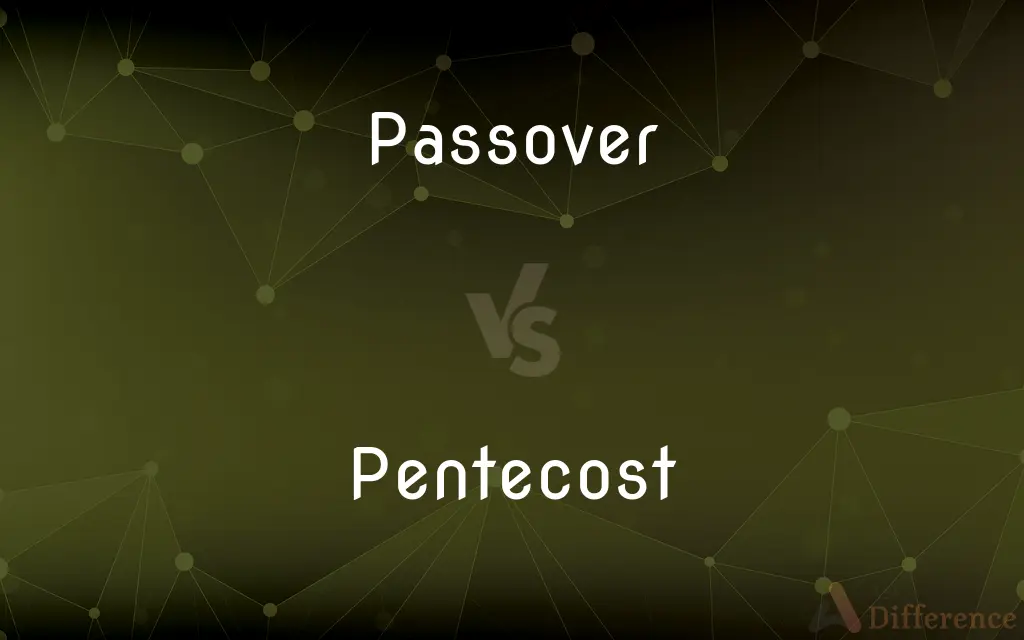Passover vs. Pentecost — What's the Difference?
By Tayyaba Rehman & Maham Liaqat — Updated on April 3, 2024
Passover commemorates the Israelites' exodus from Egypt, while Pentecost celebrates the giving of the Torah at Mount Sinai and, in Christianity, the Holy Spirit's descent upon the apostles.

Difference Between Passover and Pentecost
Table of Contents
ADVERTISEMENT
Key Differences
Passover, a pivotal Jewish holiday, marks the liberation of the Israelites from Egyptian slavery, as detailed in the Book of Exodus. It involves rituals like the Seder meal, emphasizing themes of freedom and divine deliverance. Conversely, Pentecost, known as Shavuot in Judaism, celebrates the revelation of the Torah to Moses at Sinai, a fundamental moment that shaped Jewish identity and faith. In Christianity, Pentecost commemorates the descent of the Holy Spirit upon the apostles after Jesus' resurrection, marking the birth of the Church and emphasizing spiritual renewal and empowerment.
Passover occurs in the spring, typically in March or April, and is celebrated for seven or eight days depending on Jewish tradition. It starts with the Seder, featuring symbolic foods and recounting the Exodus story. Pentecost is celebrated 50 days after Passover in Judaism, linking the freedom from Egypt to the reception of the Torah, symbolizing not just physical liberation but also spiritual enlightenment. In Christianity, Pentecost falls on the 50th day after Easter, continuing the theme of fulfillment and divine presence.
The rituals associated with Passover include removing leavened bread from homes and eating matzah, reflecting the Israelites' haste in leaving Egypt. Pentecost's observances vary; in Judaism, it includes decorating homes with greenery, studying Torah all night, and eating dairy foods, while in Christianity, it involves services that may include the wearing of red to symbolize the Holy Spirit's fire.
The themes of Passover revolve around liberation, faith in God's deliverance, and the strength to overcome adversity. Pentecost's themes, both in Judaism and Christianity, focus on revelation, the law (Torah), and the Holy Spirit, highlighting guidance, moral grounding, and empowerment for living a faith-filled life.
Despite their distinct origins and meanings, both holidays underscore the importance of divine intervention in human history. Passover emphasizes physical and spiritual liberation, while Pentecost celebrates divine revelation and the empowerment to follow a righteous path.
ADVERTISEMENT
Comparison Chart
Significance
Liberation of the Israelites from Egypt
Giving of the Torah; Descent of the Holy Spirit
Origin
Jewish tradition
Jewish tradition; Adopted into Christianity
Celebration Time
Spring (March or April)
50 days after Passover (Judaism); 50 days after Easter (Christianity)
Key Rituals
Seder meal, eating matzah
Decorating with greenery, all-night Torah study (Judaism); Services with red symbols (Christianity)
Themes
Freedom, divine deliverance
Revelation, divine law, spiritual empowerment
Duration
7 or 8 days
1 day (Judaism); varies (Christianity)
Symbolic Foods
Matzah, bitter herbs
Dairy foods (Judaism); No specific foods in Christianity
Key Practices
Removal of leavened bread
Wearing green or studying Torah (Judaism); Wearing red (Christianity)
Compare with Definitions
Passover
A Jewish festival commemorating the Hebrews' liberation from Egyptian slavery.
During Passover, families gather for the Seder meal to recount the Exodus.
Pentecost
Christian holiday marking the Holy Spirit's descent.
Pentecost is celebrated in churches with red decorations to symbolize the Holy Spirit.
Passover
Celebrated with the removal of leavened bread.
Families clean their homes thoroughly to remove all leaven before Passover.
Pentecost
Involves customs like decorating with greenery (Judaism).
Synagogues are decorated with plants for Pentecost to remember Sinai.
Passover
Involves eating symbolic foods like matzah.
Matzah is eaten throughout Passover to remember the Israelites' quick departure from Egypt.
Pentecost
Jewish festival celebrating the giving of the Torah at Sinai.
Pentecost (Shavuot) is observed by studying Torah all night.
Passover
Focused on themes of liberation and faith.
Passover rituals emphasize the importance of faith in divine deliverance.
Pentecost
Focuses on revelation and empowerment.
Pentecost highlights the role of the Torah and the Holy Spirit in guiding and empowering believers.
Passover
A time for recounting the story of Exodus.
The Passover Seder includes reading the Haggadah, which tells the Exodus story.
Pentecost
Celebrated 50 days after Passover/Easter.
Pentecost's timing establishes a link between liberation and law/revelation.
Passover
Passover, also called Pesach (; Hebrew: פֶּסַח Pesaḥ), is a major Jewish holiday that occurs on the 15th day of the Hebrew month of Nisan, the first month of Aviv, or spring. The word Pesach or Passover can also refer to the Korban Pesach, the paschal lamb that was offered when the Temple in Jerusalem stood, to the Passover Seder, the ritual meal on Passover night, or to the Feast of Unleavened Bread.
Pentecost
(Christianity) The seventh Sunday after Easter, commemorating the descent of the Holy Spirit upon the disciples. Also called Whitsunday.
Passover
A holiday beginning on the 14th of Nisan and traditionally continuing for eight days, commemorating the exodus of the Hebrews from Egypt. Also called Pesach.
Pentecost
The Christian holiday of Pentecost is celebrated on the 50th day (the seventh Sunday) from Easter Sunday. It commemorates the descent of the Holy Spirit upon the Apostles and other followers of Jesus Christ while they were in Jerusalem celebrating the Feast of Weeks, as described in the Acts of the Apostles (Acts 2:1–31).
Passover
Alternative case form of Passover
Pentecost
(Judaism) See Shavuot.
Passover
A feast of the Jews, instituted to commemorate the sparing of the Hebrews in Egypt, when God, smiting the firstborn of the Egyptians, passed over the houses of the Israelites which were marked with the blood of a lamb.
Pentecost
A solemn festival of the Jews; - so called because celebrated on the fiftieth day (seven weeks) after the second day of the Passover (which fell on the sixteenth of the Jewish month Nisan); - hence called, also, the Feast of Weeks. At this festival an offering of the first fruits of the harvest was made. By the Jews it was generally regarded as commemorative of the gift of the law on the fiftieth day after the departure from Egypt.
Passover
(Judaism) a Jewish festival (traditionally 8 days) celebrating the exodus of the Israelites from Egypt
Pentecost
A festival of the Roman Catholic and other churches in commemoration of the descent of the Holy Spirit on the apostles; which occurred on the day of Pentecost; - called also Whitsunday.
Pentecost
Seventh Sunday after Easter; commemorates the emanation of the Holy Spirit to the apostles; a quarter day in Scotland
Pentecost
(Judaism) Jewish holy day celebrated on the sixth of Sivan to celebrate Moses receiving the Ten Commandments
Common Curiosities
How are the themes of Passover and Pentecost reflected in their observances?
Passover observances focus on liberation and divine deliverance, while Pentecost celebrations highlight revelation, law, and empowerment.
Why is Passover important?
Passover is crucial as it commemorates the foundational story of Jewish liberation, faith, and identity.
What do Passover and Pentecost celebrate?
Passover celebrates the Israelites' liberation from Egypt, while Pentecost commemorates the giving of the Torah and, in Christianity, the Holy Spirit's descent.
What makes Pentecost significant?
Pentecost is significant for marking the moment of divine revelation in Judaism and the birth of the Church in Christianity, emphasizing spiritual empowerment.
How are Passover and Pentecost related?
In Judaism, Pentecost occurs 50 days after Passover, linking physical liberation with spiritual revelation. In Christianity, it follows Easter, continuing the theme of fulfillment and divine intervention.
How is Pentecost observed differently in Judaism and Christianity?
In Judaism, Pentecost involves decorating with greenery, studying Torah, and eating dairy foods, while in Christianity, it includes services with symbols like red to represent the Holy Spirit.
Can non-Jews participate in Passover and Pentecost celebrations?
Non-Jews are often welcomed to participate in Passover Seder meals and Christian Pentecost services, fostering understanding and interfaith dialogue.
What are the key rituals of Passover?
Key rituals include the Seder meal, eating matzah, and removing leavened bread from homes.
How do Passover and Pentecost influence modern faith practices?
They influence modern faith practices by reinforcing themes of freedom, divine guidance, and spiritual empowerment in religious communities.
Are there specific foods associated with Pentecost in Christianity?
While there are no specific foods universally associated with Christian Pentecost, some communities might adopt symbolic practices or themes related to the Holy Spirit.
Share Your Discovery

Previous Comparison
Sting vs. Bite
Next Comparison
Wolpertinger vs. JackalopeAuthor Spotlight
Written by
Tayyaba RehmanTayyaba Rehman is a distinguished writer, currently serving as a primary contributor to askdifference.com. As a researcher in semantics and etymology, Tayyaba's passion for the complexity of languages and their distinctions has found a perfect home on the platform. Tayyaba delves into the intricacies of language, distinguishing between commonly confused words and phrases, thereby providing clarity for readers worldwide.
Co-written by
Maham Liaqat















































